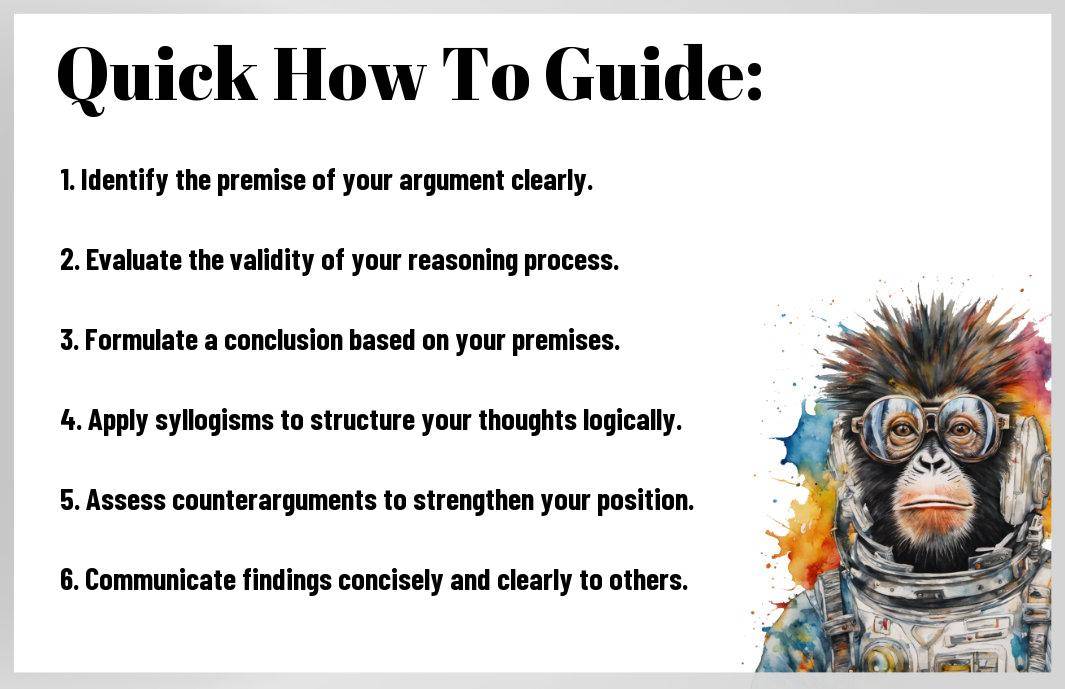
Newsletter Subscribe
Enter your email address below and subscribe to our newsletter

Enter your email address below and subscribe to our newsletter

Every day presents us with choices and challenges that require clear thinking and sound reasoning. In this post, I’ll share how I incorporate Aristotle’s timeless principles of logic into my everyday decisions and conversations. By embracing his methods, you can enhance your problem-solving skills, improve your arguments, and look at situations from different perspectives. Let’s explore how to bring a touch of ancient wisdom to our modern lives!

Before plunging into how I apply Aristotle’s logic in my everyday life, it’s helpful to grasp what this logic actually entails. There’s something wonderfully systematic about Aristotle’s approach to reasoning, characterized by syllogisms—structured arguments composed of premises leading to a conclusion. Essentially, if the premises are true, the conclusion must also be true, which makes this mode of thinking powerful for problem-solving in our daily lives.
There’s a beautiful elegance in the clarity that Aristotle provides through his logical framework. It invites us to analyze our thoughts and arguments meticulously. By laying out our premises and scrutinizing the conclusions that follow, I find that I can make more informed decisions and engage in discussions with a greater sense of confidence and understanding.
Aristotle’s contributions to logic remind us of the value of structured thinking in our lives. By embracing logical thought, you’re enhancing your ability to dissect complex situations and navigate various aspects of life, whether in personal relationships or career decisions. I often find myself applying these principles when weighing options or making important choices, as it allows me to cut through confusion and focus on what truly matters.
Understanding the importance of logical thinking means accepting that life is filled with arguments and decisions that must be examined carefully. You can reduce uncertainty and feel empowered by recognizing logical patterns and applying them consistently. By doing so, I find that not only do I improve my thought processes, but I also cultivate a more reasoned approach to discussions and debates in everyday life.

You might feel overwhelmed by the sheer volume of information we encounter every day. To make sound decisions in life, it’s crucial to sift through this noise and identify the relevant pieces that will impact your choices. Start by defining the issue at hand and asking yourself what specific information pertains to that situation. This will help you narrow down the facts, opinions, and data that truly matter, making it easier to weigh your options effectively.
After isolating the relevant information, evaluate it critically. Ask yourself questions like: Where did this information come from? Who is the source? Does this align with what I already know? By taking the time to assess and validate the information at your disposal, you’ll feel more confident in your decision-making process and less likely to be swayed by misleading or irrelevant data.
Arguments put forth can often influence my decisions more than I realize. It’s important to weigh the various arguments presented to me, assessing their strengths and weaknesses. I find it helpful to consider the evidence that supports each argument. Is it based on facts, reliable studies, or expert opinions? By analyzing these elements, I can find clarity in what makes sense versus what is merely noise.
Another aspect of weighing evidence is to think about potential counterarguments. What are the opposing viewpoints, and how strong are they? This not only enriches my understanding of the topic but also helps me build a more robust stance if I choose to advocate for a particular decision. By critically examining arguments from all angles, I empower myself to make more informed and balanced decisions moving forward.
Unlike many people assume, employing Aristotle’s logic in our daily conversations doesn’t require a philosophy degree. It just takes practice and a little bit of intentionality. When I engage in discussions, I try to incorporate some practical habits that help us reason better together. Here’s a handy checklist you might find useful:
Thou may find that applying these tips can transform your conversations into more productive and fulfilling exchanges.
If you want to use logic effectively in conversations, the key starts with listening. I have found that truly understanding another person’s perspective can be a game changer. It’s easy to get caught up in our own viewpoint and forget to give the speaker our full attention. By offering my ears and mind to their points, I not only respect their opinion but also gather the necessary information to respond logically. This enables me to engage on a deeper level and ensure that any counterpoints I present are relevant and grounded in actual comprehension.
Asking questions is a powerful way to refine your understanding and steer the conversation toward a logical direction. In my experience, when I ask for clarification, it opens doors to deeper understanding. Phrasing my questions in a way that invites the other person to elaborate encourages them to think critically about their own arguments, which can make for richer dialogue. I usually start with phrases like “Could you explain that further?” or “What do you mean by that?” This not only gives me clarity but also shows the speaker that I care about their logic.
This practice of asking clarifying questions can lead to revelations that both parties may not have considered initially. It prompts both of us to explore the conversation more thoroughly, helping to dismantle any misunderstandings right from the get-go. As we navigate through the discussion together, the chances of reaching a mutual understanding or resolution significantly increase. Thou will find your conversations blossoming with insight and effective reasoning!

After diving deep into Aristotle’s logic, I realized that our decision-making processes are influenced by several factors beyond just pure reasoning. These elements can shape how we interpret situations and draw conclusions, sometimes skewing our judgments more than we might realize. Here are some of the key factors that can affect our logical choices:
This awareness can empower us to critically assess our thinking and work to refine our logical skills.
Any time I find myself in a heated situation, I notice that my emotions can cloud my judgment significantly. Whether I am feeling joy, sadness, anger, or fear, these sentiments can lead me to conclusions that aren’t entirely based on facts. It’s fascinating how our feelings can hijack our reasoning abilities, often steering us towards decisions that align more with our emotional state than the logic at hand.
When I take a moment to reflect, I realize it’s vital to acknowledge my emotions while also striving to separate them from the logical process. By doing so, I can better evaluate my choices and work towards decision-making that is grounded in more objective reasoning.
Fallacies are errors in reasoning that can sneak into our thought processes without us even realizing it. I’ve found that they often lead to misinterpretations or hasty conclusions, clouding the clarity I’m trying to achieve in my discussions. Some common fallacies include ad hominem attacks, straw man arguments, and slippery slope reasoning. These can subtly influence how we analyze information and communicate our ideas to others.
Understanding logical fallacies is an important step in elevating my reasoning skills. By familiarizing myself with these pitfalls, I can identify when I’m being led astray or when someone else might be manipulating the argument. This awareness allows me to engage in more fruitful conversations and reach decisions that are based on sound reasoning rather than flawed logic.
Once again, Aristotle’s logical principles come into play when we face everyday challenges. By applying his structured approach, I can break down issues into manageable parts and evaluate them more clearly. This leads to better-informed decisions, ultimately enhancing my problem-solving skills. His method invites me to explore all angles of a situation, from identifying the premises to understanding the conclusions that can be drawn. This thorough exploration often reveals insights I may have overlooked initially, allowing me to tackle problems more effectively.
You can start by defining the problem clearly and succinctly. I find that it helps to frame the issue in a way that considers underlying assumptions while ensuring I focus on the most significant aspects. For example, when I encounter a dilemma, I create a statement summarizing the conflicting dynamics at play. This approach enables me to dissect the problem and see it from different perspectives, allowing for a more comprehensive understanding of what needs to be addressed.
Structuring my thoughts logically not only enhances my understanding of a problem but also guides me toward innovative solutions. By systematically analyzing each component of an issue, I can explore various possibilities and outcomes. This structured approach encourages me to think beyond conventional solutions, facilitating creativity. In fact, I often find myself brainstorming unconventional solutions that can lead to breakthroughs I wouldn’t have arrived at through random thinking alone.
Aristotle’s emphasis on evaluating possibilities and outcomes helps elevate the problem-solving process. By consistently applying logic, I can compare various solutions and assess their feasibility based on sound reasoning. This systematic analysis not only nurtures creativity but also strengthens my conviction in the decisions I choose to implement. In a way, it transforms the often chaotic process of finding solutions into a more navigable and fulfilling journey.
Your journey to honing your logical thinking skills can be both fun and intellectually stimulating. By incorporating daily exercises into your routine, you can sharpen your reasoning abilities, making it easier for you to navigate through everyday scenarios. Whether it’s through puzzles, journaling, or engaging in discussions, these activities will help you develop a stronger logical mindset. A consistent approach is key, so let’s examine some activities that can easily fit into your daily life!
An excellent way to boost your logical thinking is to engage with logic puzzles. From Sudoku to brain teasers, these activities challenge your mind to think critically and analyze different scenarios. Whenever I tackle a puzzle, I find that my brain starts to seek patterns and relationships, making connections that might not seem obvious at first glance. You can set aside 15 minutes each day to enjoy a puzzle that pushes your limits—it’s surprising how much progress you can make over time!
With reflective journaling, I’ve found that taking the time to jot down my thoughts can enhance my logical reasoning abilities. Each entry allows me to dissect my day, analyze my decisions, and evaluate different perspectives. As I write, I find myself naturally sorting through my thoughts, often leading me to clearer, more structured ideas. This not only sharpens my logic but also fosters self-awareness, allowing me to identify any recurring patterns in my thinking or problems.
Thinking deeply about my experiences as I journal has opened my eyes to how my thoughts connect and interact. I often ask myself questions while writing—such as “Why did I react that way?” or “What alternatives could I have considered?” This exploration not only challenges my logical reasoning but also cultivates a habit of critical thinking. By investing time in reflective journaling, you’ll start to notice clearer and more logical conclusions in both your writings and your everyday life.
Considering all points, I find that using Aristotle’s logic in our everyday lives can greatly enhance the way we think, communicate, and solve problems. By applying principles such as syllogism, we can clarify our reasoning processes and make more structured arguments. It encourages me to examine not just my conclusions but the premises that lead me there. In everyday discussions, whether casual or serious, I can leverage these logical tools to navigate debates and misunderstandings more effectively. It’s all about approaching situations with a logical mindset, helping both myself and those around me to engage in more constructive dialogue.
I’ve discovered that incorporating Aristotle’s logical principles helps me better understand the world around me and the various perspectives that exist. I also appreciate how these timeless ideas influence our modern thinking. For a deeper examine how [How Aristotle’s Logic Continues to Shape Our Modern Way …](https://medium.com/@besrayarat/how-aristotles-logic-continues-to-shape-our-modern-way-of-seeing-the-world-7a7c96a72ea8), you can explore the intriguing connections between ancient thought and contemporary challenges. Ultimately, I believe that anyone can benefit from bringing a touch of logical reasoning into their daily interactions, enriching both personal and professional relationships.
A: Aristotle’s logic is a system of reasoning that focuses on syllogisms—deductive reasoning where a conclusion is drawn from two or more premises. It helps clarify thoughts, enables effective problem-solving, and fosters informed decision-making. Understanding this logic provides a framework to analyze situations critically and arrive at sound conclusions in personal and professional contexts.
A: To identify premises and conclusions, look for statements that provide support or reasons (premises) and a statement that expresses a judgment or decision based on those reasons (conclusion). Phrases like “therefore,” “hence,” or “so” usually precede conclusions. Practice by breaking down conversations or written arguments into their component parts to see how they connect logically.
A: Yes, Aristotle’s logic can be beneficial in conflict resolution by promoting clear communication and understanding. One can use structured reasoning to present their viewpoint while examining the other party’s premises and conclusions. This promotes a respectful dialogue, helps identify misunderstandings, and allows for finding common ground based on logical reasoning rather than emotional reactions.
A: To apply validity and soundness, start by ensuring that your arguments are logically valid—meaning if the premises are true, the conclusion must also be true. Additionally, check the truth of your premises; this is where soundness comes in. An argument can be valid but not sound if the premises are false. Focus on constructing arguments with both correct logic and factual premises for robust conclusions.
A: Aristotle’s logic can be applied in various everyday situations such as making decisions about purchases, analyzing news articles, negotiating at work, resolving personal disagreements, creating plans or strategies, and evaluating proposals. By breaking down the reasoning behind various choices or claims, one can make better-informed decisions in any context.
A: To cultivate critical thinking skills based on Aristotle’s logic, start by practicing clearly articulating your thoughts and arguments. Engage with diverse perspectives, question assumptions, evaluate evidence, and analyze the structure of arguments in discussions or writings you encounter. Regularly practicing these skills can enhance your ability to think critically and argue effectively.
A: Numerous resources can enhance your understanding of Aristotle’s logic. Consider reading classical texts like “The Organon,” which outlines his logical theories. Additionally, modern books on critical thinking and logic can provide practical examples and exercises. Online courses and workshops focused on logical reasoning and argument analysis can also help improve your skills in applying Aristotle’s logic in everyday life.